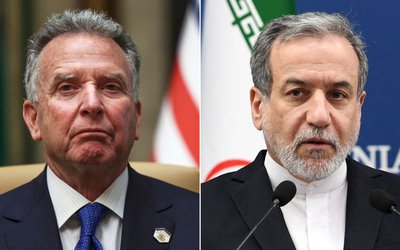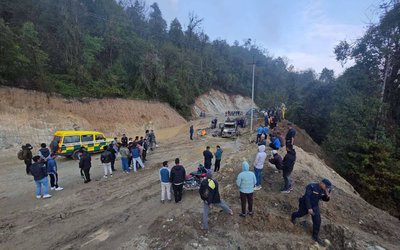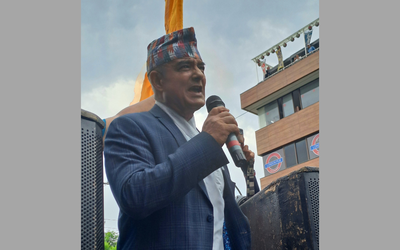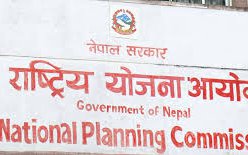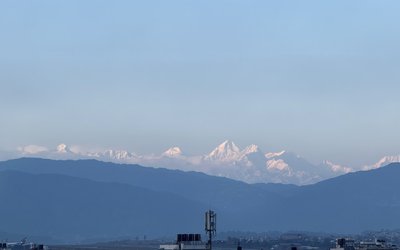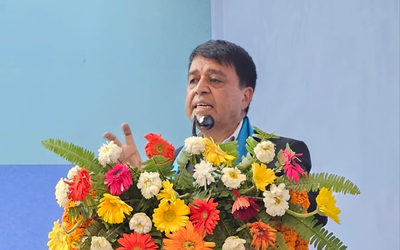
Nepal’s new communist prime minister, KP Oli, has paid obeisance in Beijing, where he agreed to the proposal to extend the railway from Shigatse in Tibet to his country so as to reduce Nepali dependence on India. For India, Nepal is not just another neighbour but one that is symbiotically linked through close cultural affinity, overlapping ethnic and linguistic identities, and an open border permitting passport-free passage. The China-Nepal railway — a “game changer”, as a Chinese mouthpiece called it — will compound the impact on India’s strategic interests of Nepal’s emergence as the world’s sixth communist-ruled country.
The two communist groups that came to power in February merged into a single party in May. The new Nepali Communist Party, with almost two-thirds majority in Parliament and governments in six of the nation’s seven provinces, casts an ominous shadow over Nepal’s sputtering democratic transition. From constitutional functionaries, such as the president and vice president, to key officials, including the chief of police services, are today card-carrying communists.
Emboldened by the communists’ pervasive domination, Oli has started undermining the independence of Nepal’s institutions, from the judiciary to the election commission. The communists’ next target will likely be the army. Whether democracy will survive under communist rule is uncertain. What is clear is that Nepal is impinging on Indian security.
A Nepal increasingly open to Chinese influence shares a tightly guarded frontier with Tibet but wishes to maintain an open border with India. India has repeatedly advised Nepal that its southern border belt is turning into a zone of jihadist and foreign intelligence activities that threaten Indian security. Nepal has also become a major transit point for the flow of counterfeit Indian currency, narcotics and Chinese arms to India.
Simply put, Nepal represents a critical challenge for India. But, to a significant extent, this is a self-created problem. Three Indian blunders since the mid-2000s have proved very costly for India — spearheading the abolition of Nepal’s constitutional monarchy; bringing the underground Maoists to the centre-stage of Nepali politics; and, more recently, aiding the plains people’s revolt against the new, 2015-drafted Nepali Constitution and then abandoning their movement and pressuring them (Madhesis) to participate in the 2017 elections, thus legitimising a Constitution it said was flawed.
Three Indian blunders have proved costly for India — spearheading the abolition of Nepal’s constitutional monarchy; bringing the Maoists to the centre stage of Nepali politics; and aiding the plains people’s revolt against the new Nepali Constitution and then abandoning them.
Prime Minister Narendra Modi with his Nepali counterpart KP Sharma Oli during delegation level talks in Kathmandu earlier this year
Prime Minister Narendra Modi with his Nepali counterpart KP Sharma Oli during delegation level talks in Kathmandu earlier this year(PTI)
Nepal’s new communist prime minister, KP Oli, has paid obeisance in Beijing, where he agreed to the proposal to extend the railway from Shigatse in Tibet to his country so as to reduce Nepali dependence on India. For India, Nepal is not just another neighbour but one that is symbiotically linked through close cultural affinity, overlapping ethnic and linguistic identities, and an open border permitting passport-free passage. The China-Nepal railway — a “game changer”, as a Chinese mouthpiece called it — will compound the impact on India’s strategic interests of Nepal’s emergence as the world’s sixth communist-ruled country.
The two communist groups that came to power in February merged into a single party in May. The new Nepali Communist Party, with almost two-thirds majority in Parliament and governments in six of the nation’s seven provinces, casts an ominous shadow over Nepal’s sputtering democratic transition. From constitutional functionaries, such as the president and vice president, to key officials, including the chief of police services, are today card-carrying communists.
Emboldened by the communists’ pervasive domination, Oli has started undermining the independence of Nepal’s institutions, from the judiciary to the election commission. The communists’ next target will likely be the army. Whether democracy will survive under communist rule is uncertain. What is clear is that Nepal is impinging on Indian security.
A Nepal increasingly open to Chinese influence shares a tightly guarded frontier with Tibet but wishes to maintain an open border with India. India has repeatedly advised Nepal that its southern border belt is turning into a zone of jihadist and foreign intelligence activities that threaten Indian security. Nepal has also become a major transit point for the flow of counterfeit Indian currency, narcotics and Chinese arms to India.
Simply put, Nepal represents a critical challenge for India. But, to a significant extent, this is a self-created problem. Three Indian blunders since the mid-2000s have proved very costly for India — spearheading the abolition of Nepal’s constitutional monarchy; bringing the underground Maoists to the centre-stage of Nepali politics; and, more recently, aiding the plains people’s revolt against the new, 2015-drafted Nepali Constitution and then abandoning their movement and pressuring them (Madhesis) to participate in the 2017 elections, thus legitimising a Constitution it said was flawed.
New Delhi indeed owes an apology to Nepal’s citizens for its past meddling, which, as if to underscore the law of unintended consequences, boomeranged on India’s own interests. India’s mistakes set in motion developments that seriously eroded its clout in Nepal and helped China to make major inroads.
When history is written, one Manmohan Singh blunder in particular will stand out for empowering Nepali communists and undermining India’s long-term interests — engineering the ouster of Nepal’s monarchy, the symbol of that country’s stability, continuity and unity for 239 years. The monarchy was removed without ascertaining the will of the people through a referendum and without even a basic level of due process.
Singh’s government, which at that time was dependent on communist support at home for survival, intervened as a peace maker. But what mattered to it was just one thing — accommodating the Maoists’ main demand for the monarchy’s removal in order to bring them into the Nepali political mainstream. It hosted a meeting between Nepal’s Maoists and opposition parties in November 2005 at which an accord to abolish the monarchy was reached. How empowering Nepali Maoists and other communists would serve India’s interest, and what the larger implications of the monarchy’s abolition would be for Nepal’s future, were issues that went unexamined.
The upshot was that Nepal went from being a Hindu kingdom (indeed the world’s only officially Hindu nation) to coming under the sway of communists, who largely filled the void from the monarchy’s removal, thereby undercutting the influence of the Nepali Congress Party, dominant until then. From 2008, the Nepali communists were in coalition governments for almost a decade before capturing power on their own in the last elections. Oli’s Marxist-Leninist Party and the Maoists, which fought the elections jointly under China’s advice, tapped into grassroots anger over the Indian-backed Madhesi protesters’ earlier border blockade.
India, paradoxically, is still unable to make peace with its own Maoists. In fact, the Nepali Maoists’ Indian-assisted success in enjoying power after a decade-long bloody insurrection has emboldened the Indian Maoists to step up their hit-and-run attacks on police and paramilitary troops. Meanwhile, the Maoists’ dreamland, China, is pulling Nepal into its orbit. India is reaping what it sowed.
The views expressed are personal. Courtesy: Hindustan Times


